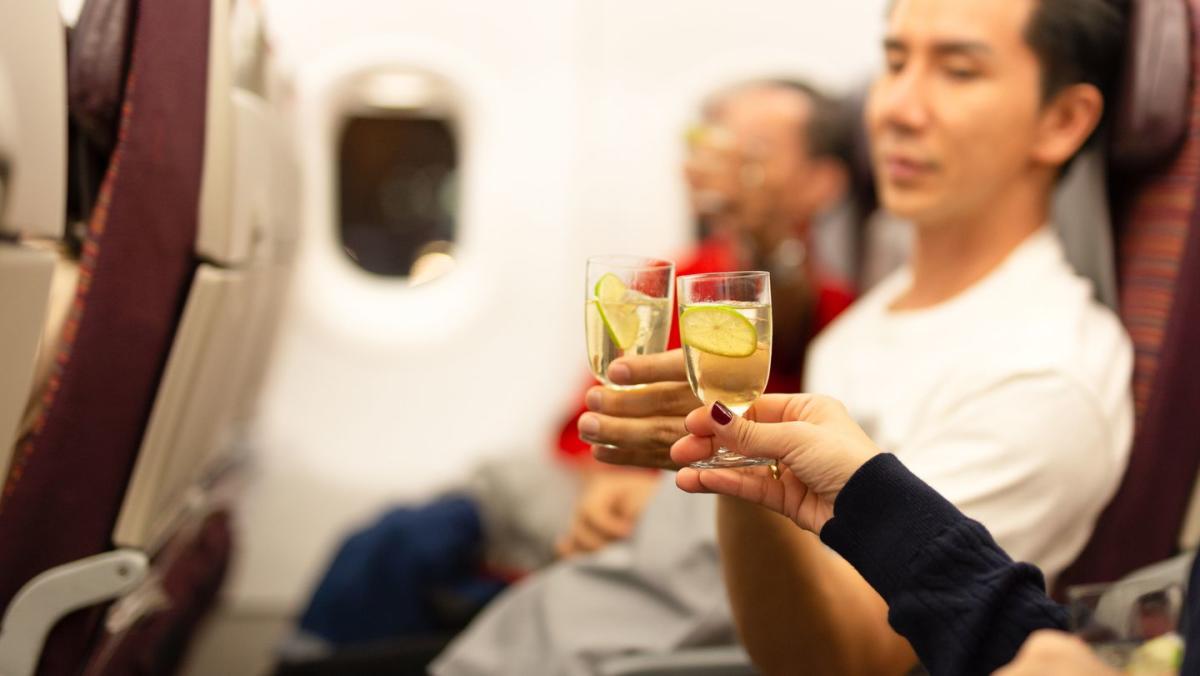Fitness
What Happens to Your Body When You Drink Alcohol on a Plane?

-
Drinking alcohol on an airplane may have unwanted side effects.
-
Recent research found that drinking alcohol and then sleeping on a flight may lower blood oxygen levels and increase heart rate.
-
Experts explain the findings.
Whether you fear flying or simply want to get an early start on vacation, having an in-flight cocktail is not uncommon. However, new research shows that you may want to skip it. A study found that drinking on an airplane may be bad for you, with surprising side effects.
A study published in Thorax looked into what happens to your body when you drink alcohol on a plane. More specifically, researchers sought to understand how sleeping in a pressurized cabin after consuming alcohol may impact sleep quality and heart health.
The small study included 48 healthy adults, who were 18 to 40 years old, and were split into two different groups. Within each group, 12 people consumed the equivalent of two cans of beer or two glasses of wine; the other 12 did not drink. One group slept for four hours in a sleep lab with air pressure at sea level, while the other half slept for the same amount of time in an altitude chamber to simulate in-flight cabin pressure. Two days after this original test, the drinker and non-drinker groups switched.
Researchers found that both drinkers and non-drinkers in the normal pressure setting had relatively stable blood oxygen concentrations and heart rates. Blood oxygen concentrations were 95% and 96% for the drinkers and non-drinkers, respectively. Those who had alcohol had an average heart rate of 77 beats per minute (bpm), and those who didn’t had a heart rate of about 64 bpm, both of which are considered average numbers.
When participants slept in the low-pressure setting (simulating an airplane), researchers found that those who didn’t drink alcohol before falling asleep had blood oxygen levels around 88%, while those who did had an average of 85% blood oxygen concentration. For the group of people who drank, their heart rates also rose to compensate for the lower oxygen levels to an average of nearly 88 bpm.
Normal blood oxygen levels are considered 95% and higher. And while a person’s heart rate usually drops during sleep, the researchers found that—especially for the group drinking alcohol—the opposite was true.
Additionally, people who drank and slept in low-pressure settings had worse sleep quality (less time in REM cycle) compared to those who didn’t have alcohol.
So, how does drinking alcohol on an airplane impact your heart rate and blood oxygen levels? Well, it causes dehydration, which can thicken your blood and make it harder for your heart to pump it throughout your body, says Rigved Tadwalkar, M.D., a board-certified consultative cardiologist at Providence Saint John’s Health Center. “This can put strain on your heart, especially at high altitudes where there is less oxygen available.” Essentially, alcohol consumption combined with hypobaric hypoxia (ie. the lowering of atmospheric pressure on a plane) leads to a decrease in blood oxygen saturation and an increase in heart rate, Dr. Tadwalkar explains.
The combination of decreased blood oxygen and increased heart rate is concerning for several reasons, Dr. Tadwalkar continues. “Firstly, low blood oxygen (hypoxemia) forces the heart to work much harder to deliver oxygen to vital organs.” This increased workload can impact the heart muscle, especially for those with pre-existing conditions like coronary artery disease or heart failure. In severe cases, prolonged hypoxemia could lead to a heart attack or stroke, he points out. “Secondly, a rapid heart rate (tachycardia) makes the heart work faster and less efficiently, further reducing its ability to pump enough blood to the body.” This is also problematic for those with pre-existing heart problems. And, a chronically high heart rate is a risk factor for developing other cardiovascular issues, including weakening of the heart muscle (cardiomyopathy), he adds.
The study suggests that alcohol consumption on airplanes worsens both low blood oxygen and rapid heart rate, says Dr. Tadwalkar. “This combined effect can be particularly dangerous, especially for those with underlying heart disease.”
So, should you forego imbibing while up in the air? Dr. Tadwalkar says that avoiding alcohol on airplanes is advisable for several groups. “People with pre-existing heart or lung conditions, such as coronary artery disease, atrial fibrillation, heart failure, chronic obstructive pulmonary disease (COPD), or sleep apnea, are at increased risk due to the combination of alcohol’s effects and the low oxygen pressure in airplane cabins.” Older adults may find this combination particularly problematic due to age-related declines in respiratory and cardiovascular efficiency at their baseline, he adds.
Additionally, “anyone looking to optimize their sleep on a long flight should also avoid alcohol, as it can disrupt sleep quality, and in the low oxygen environment of a plane, this impaired sleep may not be restorative,” Dr. Tadwalkar notes.
The bottom line
Drinking alcohol on airplanes, particularly during long-haul flights, can negatively impact the body’s oxygen saturation and increase heart rate, says Dr. Tadwalkar. “This is important because even in healthy individuals, low blood oxygen levels (hypoxemia) and a high heart rate (tachycardia) can place strain on the cardiovascular system.”
Understanding how alcohol interacts with the hypoxic environment of airplane cabins allows people to make informed decisions about their in-flight beverage choices, Dr. Tadwalkar adds. “This knowledge can empower travelers to prioritize their health and well-being during air travel.”
In essence, if you have any health concerns or want to ensure the best possible flight experience, it’s probably best to avoid alcohol, Dr. Tadwalkar advises.
You Might Also Like










